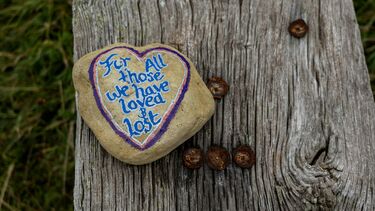Blog post #10 āSittingā with sadness: death and loss in research
By Julie Ellis
- This blog post shares personal reflections of one Cripping Breath researcher about attending a grief workshop we participated in as a team.
- It discusses how Cripping Breath as a project has been affected by death so far, and highlights that there is little attention paid to loss as part of the research process.
- Towards the end of the post we highlight some questions our experiences of loss in research have raised, which we think are important for the wider research community, universities and funders to consider.
I can see the familiar faces framed in tiles on my computer screen, all lined up neatly with small smiles, waiting. The cursor is blinking. Thereās a question, and now silence. Who will speak first? Maybe I could start us off? No, I shouldnāt talk too much. Why donāt you just wait... Urgh this feels a bit tricky! Maybe I should go first. Yep, ok, here goesā¦
Itās true, I have always had a bit of trouble with silences! Strained pauses in conversation, unanswered questions in the classroom and especially those times in meetings when no one really wants to go first and reluctance hangs awkwardly in the air. I tend to break the silence quicker than most - even if Iām not sure exactly what it is I want to say! On this day, a Tuesday morning in April, it was no different. I was sitting in my home office, cup of tea to hand, joining my Cripping Breath colleagues for an online workshop about ādealing with griefā facilitated by . We had just started and it wasnāt long before I had the all too familiar urge to avoid silence, to usher away unease with chatter.
In preparation for the workshop we had been primed to expect the possibility of emotional responses and maybe some difficult conversations. This wasnāt going to be a typical team training session and the uncertainty as well as the sensitivity of the topic seemed to heighten my tendency to ruminate. While introspection isnāt particularly unusual for me, on reflection, I do wonder if there was something additional going on. I suspect I put too much pressure on myself to know how to ābeā in this workshop and to respond ācorrectlyā to what my colleagues might share. Given that I have been a for 15 years and have had lots of opportunities to reflect on loss, I should be the expert on this by now, right? Wrong, of course! While I like to think Iāve grown accustomed to talking about death I can recognise in my own responses that despite my ātrainingā, sometimes it is just a really difficult thing to talk about. Itās also something that we rarely discuss happening in the academy - that is in universities, to academics and researchers. As someone who has studied death, I have drawn on a relatively small body of work which discusses the in researching end of life issues (and I have ). Some of these reflections are about āmanagingā the loss of research participants or bearing witness to the suffering of others, but less so about deaths within a research team - of those we work alongside - and what this means for the research process.
For Cripping Breath these are conversations we cannot and do not want to avoid. As a group of researchers, many of whom live with health conditions which mean they share similar embodied vulnerabilities with the people who will be our ventilated research participants, we need to find a way to sensitively consider proximity to death and the fragility of life as a reality in our work. Commissioning the grief workshop was one example of how we are actively working to do this, but itās just the beginning. Our time with Teresa helped us to consider the importance of things like normalising emotional honesty within the team, prioritising self-care and avoiding the idea that grief can be made ābetterā or āfixedā - itās not a void (or a silence) that can be filled by saying the ācorrectā thing. Yet how we make space for āsittingā with loss, and accepting the painful pauses it may bring within the ebbs and flows of our work, is something we need to keep working on together. Participating in the workshop has also made me aware of a particular challenge I will face as we try to do this. Iāll put it plainly but itās actually quite hard for me to say - as a non-disabled member of the team I do not share the clinical vulnerability that some of my colleagues do; for me, my proximity to death is perhaps quite different. This makes me feel lots of things including uncertainty about broaching the subject of death and loss. I worry I might be insensitive; fret about the inequity inherent in the privilege of my own health, and I donāt ever want to assume how my disabled co-researchers feel about death-related conversations or how they might want to approach these (or not).
So itās hard, but loss will be an inevitable part of our research. We know this because it has been there from the start. Just days after Cripping Breath began, our key collaborator Sally Whitney-Mitchell - a brilliant researcher who co-designed much of our co-production approach - died when she was just 36. Sally was a researcher without any formal training, and was someone who fell in love with inquiry and writing in her role as a lived experience co-researcher in about disabled young people living with life limiting and life threatening impairments. Her sudden death took a lot of time to come to terms with, especially as some of us had been working with Sally, across projects, for a number of years. Since Sallyās death, we have also lost two of our community researchers, Stephen Deal and SeĆ”n Fitzsimons. Their deaths also occurred suddenly and very soon into their time working on the project.
Beyond the sadness and shock we felt (despite their fragile health, it was still very much unexpected to lose three team members so soon into our work), a number of responsibilities came into view quickly:
- How do we tell our other community researchers, and what support could/should we offer when we do?
- How do we acknowledge late community researchersā contributions to the project?
- What, if anything, should we āsayā as a project publicly about their deaths?
- How can we send our love and best wishes to their partners, family members, and communities?
- And not least of all, how do we navigate institutional systems, such as those within universities, which bring at a time when we perhaps just canāt face them?
These are all issues we are working-through as our project develops and we hope to be able to share how we have navigated them in future blog posts, publications and talks (see (in press) for reflections so far). We see this as an opportunity to facilitate conversations in the wider research community (including universities and funding bodies) around how we account for loss in the research process.


